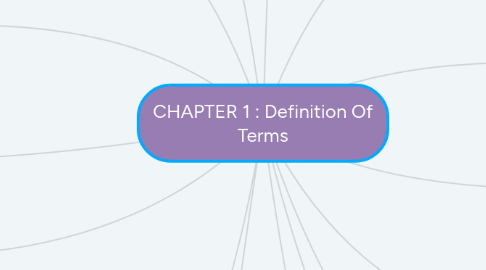CHAPTER 1 : Definition Of Terms
作者:Iena Nuriena

1. Private Records
1.1. Records created, received and maintained by non-governmental organizations, families or individuals relating to their private and public affairs.
2. Records Center
2.1. Types Of Records Center
2.1.1. National Records Center
2.1.2. Departmental Records Center
2.1.3. Commercial Records Center
2.2. Records Center Control Files Procedures
2.2.1. Inactive Records Index
2.2.2. Charge-out and Follow-up File
2.2.3. Destruction Date File
2.2.4. Destruction File
3. Archives
3.1. Records, usually but not necessarily a long-term records, of enduring value selected for permanent preservation.
3.2. Archives will normally be preserved in an archival repositary.
4. Archival Repository
4.1. A building or part of a building in which archives are preserved and made available for consultation also known as an archives.
5. Evidence
5.1. An indication, sign, testimony, in support of a conclusion.
5.2. Characteristics
5.2.1. Permanence
5.2.2. Value as official sources of information
5.2.3. Authentic
5.2.4. Unique
6. Permanence
6.1. Values as Official Source of Information
6.1.1. Records should have authority so that they should be considered to be the true, official account or report that will have universal validity as the one true records.
7. Unique
7.1. Records are unique in that they are documents of a single or individual event or transaction that will not be repeated in the same time, at the same place or for the same actions.
8. Retrieval
8.1. It is the process of finding records and/or information.
9. Data
9.1. Representation of information in a formalized manner, suitable for communication, interpretation and processing, generally by a computer system.
9.2. Raw data refers to unprocessed data
10. Document
10.1. A medium through which information is imprinted for conveyance to one or more than one person
10.2. In a paper-based records management system, a document is usually defined as the smallest unit for filing.
10.3. It can also refer to other non paper-based items, such as computer files.
11. Information
11.1. Information is something that can lead to knowledge regardless of the medium of its conveyance to one or more persons.
12. Record
12.1. Recorded information in a form of documents regardless of form or medium made or received by an organization and that is useful in the operation of the organization.
12.2. It provides evidence of a business transaction.
12.3. Records provide the memory or history of what has taken place in the past - even yesterday.
13. Filing
13.1. It is the action of arranging records in a predetermined sequence.
14. Public Records
14.1. Records created or received and maintained in any public sector agency.
15. Authentic
15.1. Records are supposed to be authentic in that they document accurately what actually transpired and indicate what was actually the state of affairs at a particular point of time.
15.2. They cannot changed or altered as an after thought.
15.3. Any changes should only result in adding on to the existing documentation and not removing or deleting existing information.


